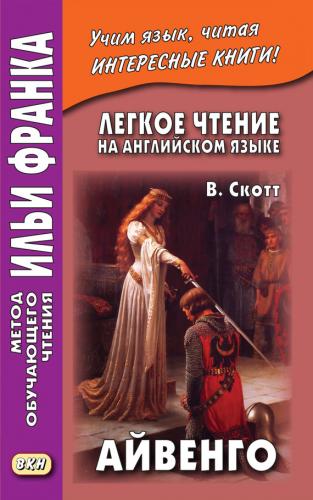exclaim [ɪk’skleɪm], guest [ɡest], announce [ǝ’naʋns], duty [‘dju:tɪ]
“And here come Prior Aymer and that Templar, Brian de Bois-Guilbert! Normans both of them!” he exclaimed when the guests were announced. “But I know my duty as a host. Tell them that they are welcome at Rotherwood! I’ve heard that priors and Templars are fond of drinking, so bring out our best wine for our guests!”
Cedric invited the Prior and the Templar (Седрик пригласил приора и тамплиера) to sit beside him at the head of the table (сесть рядом с ним во главе стола; head – голова; передняя, головная часть /чего-либо/). The pilgrim, however, said (пилигрим, однако, сказал) he preferred to have his supper standing by the great fireplace (что он предпочитает поужинать, стоя у большого камина), away from all the other guests (вдали от всех других гостей).
beside [bɪ’saɪd], preferred [prɪ’fǝ:d], fireplace [‘faɪǝpleɪs]
Cedric invited the Prior and the Templar to sit beside him at the head of the table. The pilgrim, however, said he preferred to have his supper standing by the great fireplace, away from all the other guests.
When Gurth and Wamba came into the great hall a little while later (когда Гурт и Вамба вошли в большой зал немного позже), the Templar recognized them from the forest (тамплиер узнал их /из леса = после встречи в лесу/; to recognize – осознавать, постигать; узнавать, опознавать / кого-либо или что-либо виденное, знакомое ранее/).
“You will die a violent death one day (ты умрешь насильственной смертью когда-нибудь; violent – неистовый; насильственный; one day – когда-то; однажды; когда-нибудь),” he said to Wamba, “if you continue to give wrong directions to travellers (если ты продолжишь давать неверные указания странникам) like you did tonight (как ты сделал это сегодня вечером).”
“I only made a small mistake (я только немного ошибся: «допустил маленькую ошибку»),” the jester replied. “Someone who asks a fool for directions (тот, кто спрашивает у дурака как добраться куда-либо) should be able to forgive that (должен уметь прощать это).”
recognize [‘rekǝɡnaɪz], die [daɪ], death [deθ], continue [kǝn’tɪnju:], wrong [rɔŋ]
When Gurth and Wamba came into the great hall a little while later, the Templar recognized them from the forest.
“You will die a violent death one day,” he said to Wamba, “if you continue to give wrong directions to travellers like you did tonight.”
“I only made a small mistake,” the jester replied. “Someone who asks a fool for directions should be able to forgive that.”
Their conversation was interrupted (их разговор был прерван; to interrupt – обрывать, прерывать, внезапно прекращать /разговор, дружбу и т. д./) when another visitor was announced (когда о другом госте было объявлено). It was Isaac of York, an old Jew (это оказался Исаак из Йорка, старый еврей; Jew – еврей), who had been on his way to Ashby (который направлялся: «был на своем пути» в Эшби) and had come in from the storm outside (и вошел в дом /спасаясь/ от бури /снаружи/). Cedric welcomed the old man (Седрик поприветствовал старика: «старого мужчину»; to welcome – приветствовать; радушно принимать), but none of Cedric’s men would allow a Jew to sit down beside them (но ни один из людей Седрика не позволил еврею сесть рядом с собой). Only the pilgrim offered the old man some food and drink over by the fireplace (только пилигрим предложил старику немного еды и питья у камина).
interrupt [,ɪntǝ’rʌpt], York [jɔ:k], Jew [dʒu:], allow [ǝ’laʋ]
Their conversation was interrupted when another visitor was announced. It was Isaac of York, an old Jew, who had been on his way to Ashby and had come in from the storm outside. Cedric welcomed the old man, but none of Cedric’s men would allow a Jew to sit down beside them. Only the pilgrim offered the old man some food and drink over by the fireplace.
When the Lady Rowena came into the hall at last (когда леди Ровена вошла наконец в залу), everyone stood up (все встали). She was a tall young woman (это была высокая молодая женщина) with a beautiful face (с прекрасным лицом) and clear blue eyes (и ясными голубыми глазами; clear – светлый, ясный, безоблачный /о небе/; яркий, блестящий). The Prior noticed (приор обратил внимание) that the Templar was staring at her Saxon beauty (что тамплиер /с изумлением/
